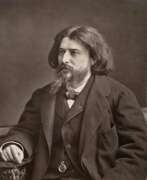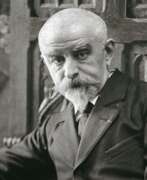Critics Naturalism


Alphonse Daudet was a French novelist and short-story writer, best remembered for his sentimental tales of provincial life in southern France. Born in Nîmes in 1840, Alphonse Daudet's early life was marked by financial hardship, influencing much of his later work. He moved to Paris with his brother Ernest and quickly immersed himself in the literary world, publishing his first collection of poems, Les Amoureuses, at a young age.
Alphonse Daudet's career flourished with notable works such as Le Petit Chose, Tartarin de Tarascon, and Lettres de Mon Moulin, which highlighted the charm and simplicity of rural life in Provence. His storytelling, often infused with humor and satire, made significant contributions to French literature, capturing the essence of Provencal culture.
Despite his literary success, Alphonse Daudet's personal life was fraught with challenges, including a long-term illness that he bravely depicted in his later works. He passed away in Paris in 1897, leaving behind a legacy celebrated for its profound impact on regionalist literature and its vivid portrayal of French life and culture during the 19th century.
For those interested in the intricate tapestry of French literature and the enchanting allure of Provence, Alphonse Daudet's works offer a gateway to the past, brimming with the richness of its regional heritage and the timeless appeal of its narratives. To delve deeper into Daudet's life and explore his contributions to literature, subscribing to updates on related sales and auction events can be a rewarding pursuit for collectors and enthusiasts alike, ensuring they remain informed about opportunities to engage with his enduring legacy.


Joris-Karl Huysmans, real name Harles-Georges-Marie Huysmans, was a French writer and poet, the first president of the Goncourt Academy.
Huysmans' father was Dutch, and he always emphasized this fact. At the age of 20, the aspiring writer began working as an official in the French Ministry of the Interior, where he served all his life.
Huysmans received the greatest fame thanks to the novel À rebours ("Against Nature"). The main appeal of this writer's work lies in its autobiographical content. And his style is characterized by a wide vocabulary of the French language, a wealth of detailed and sensual descriptions, as well as sharp satirical wit. The novels are also notable for their encyclopedic documentation, ranging from a catalog of decadent Latin authors in À rebours to a discussion of the symbolism of Christian architecture in La Cathédrale.
In his work, Huysmans expresses a distaste for modern life and a deep pessimism, but in his writings one can trace the stages of intellectual life in late nineteenth-century France. Joris-Karl Huysmans was one of the earliest proponents of Impressionism. He was also a renowned literary critic and one of the founders and first president of the Goncourt Academy.